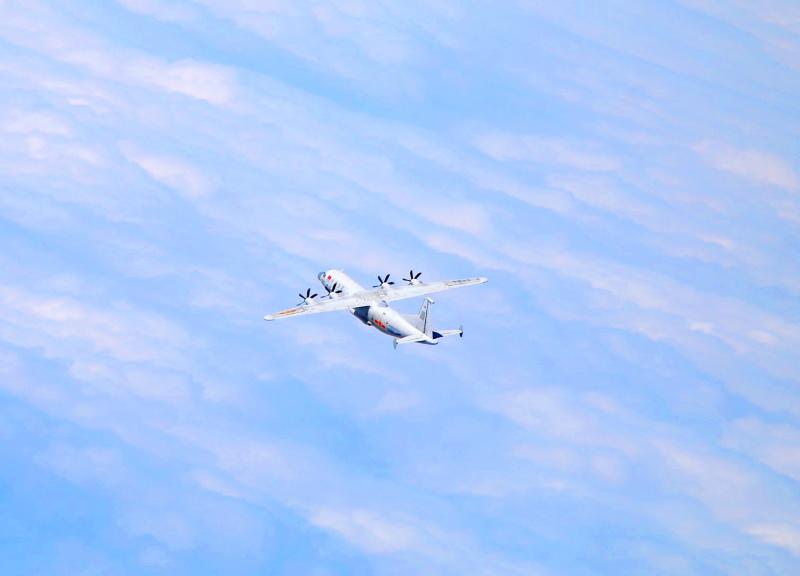Taiwan is bracing for more Chinese military patrols next year, after incursions by the Chinese People’s Liberation Army (PLA) more than doubled this year, fueling concern about a clash between the region’s big powers.
Since January, Chinese warplanes have made about 950 forays into Taiwan’s air defense identification zone (ADIZ), Ministry of National Defense data showed, up from about 380 sorties last year, when the ministry began releasing the data amid a sharp rise in such flights.
Tensions could rise further in the coming year, with key events on the political calendars for Taipei and Beijing. President Tsai Ing-wen (蔡英文) is facing local elections viewed as a bellwether for the next presidential race, while Chinese President Xi Jinping (習近平) is heading toward a party congress in which he is expected to secure a precedent-busting third term in power.

Photo courtesy of the Ministry of National Defense
“China will send more military airplanes into Taiwan’s ADIZ next year with more intimidating operations,” said Kuo Yu-jen (郭育仁), director of the Institute for National Policy Research. “The situation in 2022 is worth being concerned about as it’s going to be a turning point.”
The political events increase pressure on Tsai and Xi to show strength and the resolve to respond to perceived provocations.
US President Joe Biden, who has affirmed the US’ commitment to defend Taiwan from any Chinese attack, also has a political incentive to maintain a firm line toward Beijing before congressional mid-term elections.
Minister of National Defense Chiu Kuo-cheng (邱國正) told lawmakers in October that the closer Chinese planes came to Taiwan, “the stronger we will hit back.”
“China’s quasi-military means are part of its gray-zone tactic to intimidate and coerce Taiwan — it’s a hybrid threat,” said Ou Si-fu (歐錫富), a research fellow at the Institute for National Defense and Security Research, citing other efforts including luring Taiwan’s diplomatic allies away and economic coercion.
“China’s activities in the Strait will increase as its competition with the US intensifies,” Ou added.
The military can handle next year’s expected increase in PLA incursions, Chiu told reporters yesterday during a break in a meeting of the legislature’s Foreign Affairs and National Defense Committee in Taipei.
The armed forces maintain the combat readiness of personnel and equipment at all times with the expectation that the enemy is capable and strong, Chiu said.
On Tuesday, Biden signed the fiscal 2022 US National Defense Authorization Act, which includes provisions recommending that Taiwan be included in next year’s Rim of the Pacific Exercise.
Asked to comment on the act, Chiu said that Taiwan welcomes any aid from foreign governments, but the country’s existing capabilities must be considered before defense cooperation is strengthened.
Additional reporting by Jonathan Chin

The Ministry of Foreign Affairs (MOFA) yesterday said it is closely monitoring developments in Venezuela, and would continue to cooperate with democratic allies and work together for regional and global security, stability, and prosperity. The remarks came after the US on Saturday launched a series of airstrikes in Venezuela and kidnapped Venezuelan President Nicolas Maduro, who was later flown to New York along with his wife. The pair face US charges related to drug trafficking and alleged cooperation with gangs designated as terrorist organizations. Maduro has denied the allegations. The ministry said that it is closely monitoring the political and economic situation

Conflict with Taiwan could leave China with “massive economic disruption, catastrophic military losses, significant social unrest, and devastating sanctions,” a US think tank said in a report released on Monday. The German Marshall Fund released a report titled If China Attacks Taiwan: The Consequences for China of “Minor Conflict” and “Major War” Scenarios. The report details the “massive” economic, military, social and international costs to China in the event of a minor conflict or major war with Taiwan, estimating that the Chinese People’s Liberation Army (PLA) could sustain losses of more than half of its active-duty ground forces, including 100,000 troops. Understanding Chinese

UNRELENTING: China attempted cyberattacks on Taiwan’s critical infrastructure 2.63 million times per day last year, up from 1.23 million in 2023, the NSB said China’s cyberarmy has long engaged in cyberattacks against Taiwan’s critical infrastructure, employing diverse and evolving tactics, the National Security Bureau (NSB) said yesterday, adding that cyberattacks on critical energy infrastructure last year increased 10-fold compared with the previous year. The NSB yesterday released a report titled Analysis on China’s Cyber Threats to Taiwan’s Critical Infrastructure in 2025, outlining the number of cyberattacks, major tactics and hacker groups. Taiwan’s national intelligence community identified a large number of cybersecurity incidents last year, the bureau said in a statement. China’s cyberarmy last year launched an average of 2.63 million intrusion attempts per day targeting Taiwan’s critical

‘SLICING METHOD’: In the event of a blockade, the China Coast Guard would intercept Taiwanese ships while its navy would seek to deter foreign intervention China’s military drills around Taiwan this week signaled potential strategies to cut the nation off from energy supplies and foreign military assistance, a US think tank report said. The Chinese People’s Liberation Army (PLA) conducted what it called “Justice Mission 2025” exercises from Monday to Tuesday in five maritime zones and airspace around Taiwan, calling them a warning to “Taiwanese independence” forces. In a report released on Wednesday, the Institute for the Study of War said the exercises effectively simulated blocking shipping routes to major port cities, including Kaohsiung, Keelung and Hualien. Taiwan would be highly vulnerable under such a blockade, because it